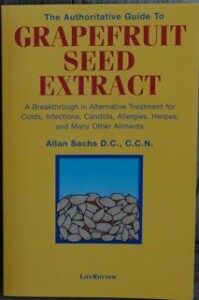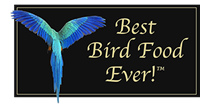
.
According to Allan Sachs, DC, CCN, in his book, “ The Authoritative Guide to Grapefruit Seed Extract”, GSE is a broad spectrum product that has the ability to work against a wide range of organisms. Hundreds of laboratory tests have shown it is powerful, safe and effective against dangerous germs even when highly diluted. An Acute Oral Toxicity Study done at Northview Pacific Labs showed that GSE is safe and non-toxic even at doses exceeding 5000 mg per kg of body weight. This is equivalent to a 200 pound (90 kg) person drinking one pound (454 gms) of pure GSE daily for two weeks. Typical doses of GSE (used in people) have no negative impact on beneficial gut bacteria.
Great for Cleaning
Although we’re still learning about the use of GSE in the care of birds, we know that it is effective in cleaning cages, enclosures and perches, and for disinfecting bird toys obtained at bird marts. It can also be used to sterilize the hands before touching parrot babies or hand-feeding them, for disinfecting surfaces, equipment and utensils in the nursery, brooders and incubators, and in the final rinse when laundering the cloth bedding for newly-hatched chicks. For healing, Leslie prepares personalized individual formulas for healing aspergillosis, candida, and reoccurring bacterial infections in parrots.
For more information on GSE, go to What is Grapefruit Seed Extract (GSE)?
Well Researched
GSE has been well researched, more than 80 scientific laboratories have performed hundreds of studies on its effectiveness. A partial list of these labs appears below. This list originally appeared in “ The Authoritative Guide to Grapefruit Seed Extract”, by Allan Sachs, DC, CCN, on pages 33 to 34.
GSE Laboratories
ABC Research, Gainesville, Florida
Abcom Chemie Co, Seoul, Korea
Alpha Chemical and Biomedical Laboratories, Petaluma, California
AquaLandis Inc, Canada
Analytical Chemical Services Inc, Columbia, Maryland
Association of Consulting Chemists and Chemical Engineers
Bioassay Systems Corp, Woburn, Massachusetts
Bio-Research Laboratories, Redmond, Washington
Brigham Young University, Provo, Utah
British Columbia Research Corp, Vancouver, BC, Canada
Coopemontecillos Division Pesca, San Jose, Costa Rica
Daiwa Kasei Chemical, Tokyo, Japan
Department of Health and Human Services, FDA, Washington DC
Department of Food Technology, Gycongsang National University, Chinju, Korea
East Chilliwack Agricultural Co-op, Chilliwack, BC, Canada
Great Smokies Labs, Asheville, North Carolina
Florida Department of Agriculture, Tallahassee, Florida
Hazelton Labs, Madison, Wisconsin
Hilltop Research Inc, Huntington Valley, Pennsylvania
Indonesian Government at the National Center for Fisheries, Jakarta
Institut Pasteur, Paris, France
Journal of Food Sciences
Journal of the Korean Agricultural Chemical Society
Journal of Orthomolecular Medicine
Lancaster Laboratories, Lancaster, Pennsylvania
Northview Pacific Labs, Berkeley, California
Silocon Valley Chemlab Inc, Santa Clara, California
Thornton Laboratories Inc, Tampa, Florida
US Dept of Agriculture, Hyattsville, Florida
United States Testing Co, Hoboken, New Jersey
Universidad Autonoma de Nuevo Leon, San Nicolas de los Garza, Mexico
Universidad National Mayor de San Marcos, Lima, Peru
University of California, Davis, California
University of Florida, Food Services Dept, Gainesville, Florida
University of Nebraska
University of Southern Florida, Dept of Biology, Tampa, Florida
Valley Microbiology Services, Palo Alto, California
Weston-Gulf Coast Laboratories, University Park, Illinois
For more information on GSE, go to What is Grapefruit Seed Extract (GSE)?
We hope this article helped shed some light on the ‘on-line’ GSE controversy. Tell us your thoughts and questions about using GSE with your birds.







